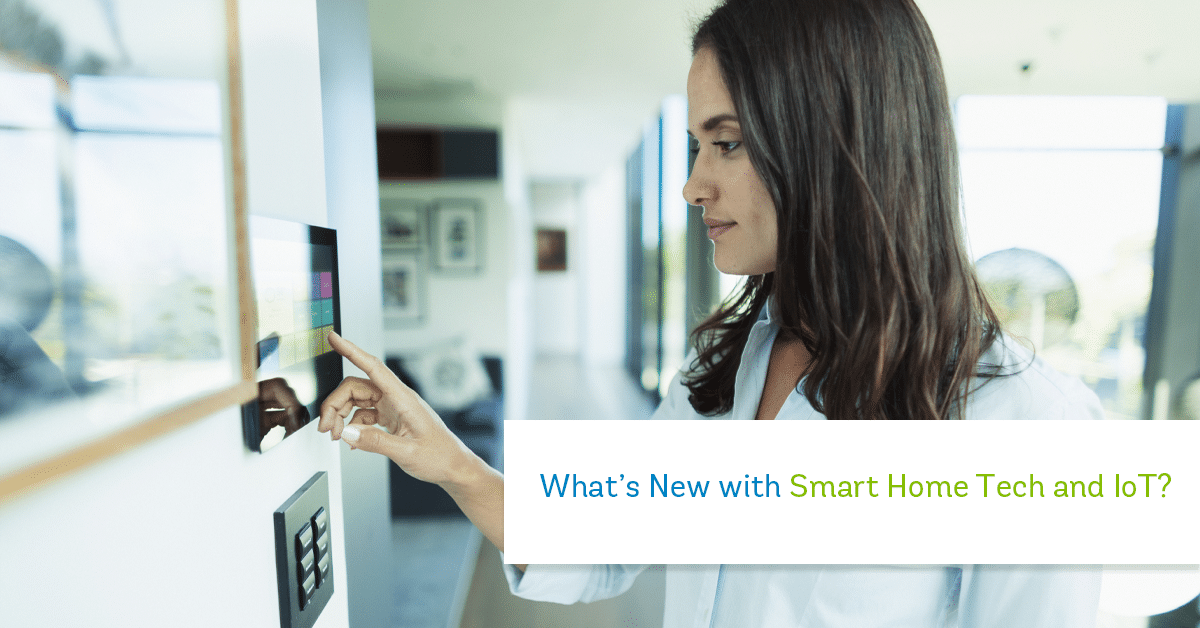What’s New with Smart Home Tech and IoT?
November 15, 2019 Category: Pop Culture
Click here to see Execulink’s Home Internet options
The Internet of Things, or IoT, is changing the way we live and what the future looks like for our daily lives. When talking about a category as broad as “Things” categorizing and defining IoT can quickly become overwhelming. So let’s break it down a bit!
The Internet of Things or more commonly, IoT, is a buzzword that refers to a network of devices typically using sensors and software to process data in one way or another, making our lives more convenient. The data is used for monitoring and controlling information from other devices through the Internet. This could be as simple as a Bluetooth speaker to listen to Spotify or as complex as a smart kettle that turns off and notifies you when it reaches the perfect temperature.
In 2019 IoT smart home device sales will reach $13 billion and are forecasted to reach a value of more than $53 billion by 2022. As well, Swedish firm Berg Insight predicts that 63 million American homes will qualify as “Smart” by 2022.
Integration of devices in the home
A growing issue is the expansion of niche products in the smart-home space. There seems to be more smart home products with which you can outfit your home released everyday. With each new system, there is a new device and sometimes a new app to add to your phone. No matter how potentially helpful these devices might be independently, they are not allied with any greater purpose. Developing a system of interacting devices in your home is an industry challenge.
Integrating Smart Home Devices to One Platform
As this challenge faces innovators in the Smart Home space, there are some options including: Samsung SmartThings, Wink, Echo, Apple home kit or Josh ai. The challenge for the customer lies in doing research to determine which is the best for your home. This can depend on which devices you currently own. The intention of these platforms is to keep your experience consistent.
The future of smart homes
Home Routines
Future homes could be entirely run by a Smart Home platform. Finding ways to optimize everyday activities like waking up, meal planning and bed time are common areas for research and development amongst IoT companies. For example, Crestron is working on a software that tracks a person’s habits, which music they like and how they prefer lighting depending on the hour of day. Then the device could use that information to build playlists and create the perfect lighting ambiance before bedtime.
Furniture
Robotic furniture company, Ori Living is working with Ikea to create furniture pieces that change based on your needs, from bed, to couch to closet space. Perfect for those interested in the rapidly growing “tiny homes” trend or for those living in a studio apartment! They take the murphy bed to the next level.
Lighting
The future holds many exciting things for those interested in upping the IQ of their lighting. Getting lights to respond to your actions automatically is the next step for this technology. For example, when lighting your home cinema, having your lights automatically dim when you’re watching a movie and adjusting appropriately depending on the genre.
Doors
Getting your door to automatically unlock as you approach using facial recognition software could be possible in the near future. Building on that idea, having the rest of your house automatically respond to your arrival could be possible, such as lights turning on or the kettle brewing!
Thermostat
It is currently possible to control your home’s temperature with an app (Nest, ecobee, etc). The future could bring automatic temperature adjustments dependent on your movements within your house – such as exercising or showering. Thermostats may even be able to sense if you are getting close to home and kick in to increase or decrease the temperature of your home depending on your preferences and the season.
Health
Cameras and sensors embedded in refrigerators could suggest more nutritious alternatives if you are reaching for too many sugary drinks. If you require prescription drugs, medicine cabinets could check if you are remembering your daily pills. Sensors in your toilet could event examine human waste before its flushed. Smart toilets such as this could help detect early signs of disease and help manage diabetes.
Challenges to IoT success
As every device in a smart home is connected to the internet, as a result there is risk of hacking. Many of these devices have cameras which monitor the inside of your home or unlock your doors. If the technology is not entirely secure, then you could be putting your home and family at risk. This risk could be catastrophic for the IoT industry. The Canadian Government has implemented minimum cyber security requirements that are standard across the industry through the National Cyber Security Strategy. These standards require vigilant updates as technology changes. At Execulink, we maintain strict cyber security policies that are designed to prevent unauthorized access by third parties.
ISPs as the backbone for your Smart Home
Homes are increasingly being built “smart”, even from the ground up. The current approach is to add IoT technology to your home as an afterthought but, this is quickly changing. Experts say that soon smart home products will become as necessary as plumbing and electricity. As our world evolves it’s becoming increasingly important to stay connected with Internet services. Explore Execulink’s Internet options to find the perfect package for your home and all its smart devices!





